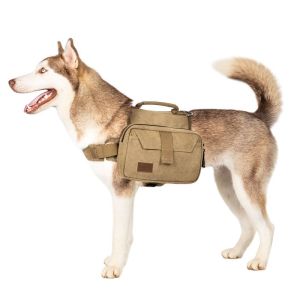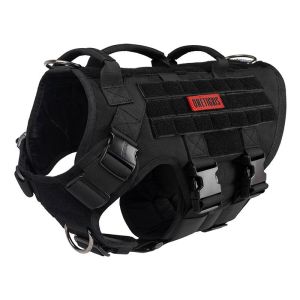

If you and your dog are outdoor enthusiasts and you want to go backpacking together, then you and your furry sidekick will get to bond through good times and great adventures. Before all the fun begins, these 3 preparations are crucial to a safe, hassle-free and fun-filled journey.

Credit @mikeveale
You should make sure your buddy is adequately prepared for being on the road, and activities such as strength training and obedience training would be a good start. These bonding sessions will help the dog and its handler build up endurance levels and be more mentally and physically in sync, paving the path for optimized experiences for both.
Important reminder: Dogs may not tell you they’re exhausted until it’s too late, so pay close attention to their breathing and other telling behavior when you’re out, particularly in the heat. Look for excessive panting or drooling, glazed eyes or lethargy when backpacking with dogs.

Credit @thenutristudent
Unless you’re relying on a dog carrier backpack... A durable harness can protect your dog from cuts and bruises, and if your dog can handle the weight, then it’s only fair that they help out with the load by carrying their own treats and water!
Important note: Keep in mind that a dog should not carry more than 25% of its body weight, and for some dogs even less than that. For most dogs, 10% to 12% of their body weight is a good starting point for loading up dog packs. This would be 5-6lb for a 50lb dog, or 2.5-3kg for a 25kg dog. Of course, the right amount depends on a number of factors, such as your dog's breed, physical fitness, and energy level, so go easy and observe with care.

Credit @littlek9runa
After fitting your dog with a comfortable harness, make sure to pair that harness with a quality leash. Dogs are better off on-leash on longer trips or if there are dangers in the area; longer leashes will provide safety while still giving them space to explore, and a bungee leash with clips on both ends are great for having your hands free, a bliss when hiking with dogs. Remember that dogs have no idea where you’re going and for how long so they will run too much in the first days and risk getting hurt on later days, which is why leashes will help you control and prepare them as necessary.

Credit @OnetTigris
Your dog will need water and treat breaks, and folding bowls will keep its contents clean from dirt and insects whilst not leaving food waste behind.

Credit @bane_the_notorious_frenchie
In certain terrains you’ll need to look out for injury to your dog’s paws from heat, thorns, frost bite, etc. Prepare the right paw attire if needed, but if unnecessary, bring some rags for cleaning happy, muddy paws when the day ends!
If your dog knows the right time to explore and the right time to stay on its mat, you’ll be able to set up camp with a peace of mind, and your dog will be able to recharge for more shenanigans!

Credit @OnetTigris
MOLLE pouches are always handy for keeping water and edibles (canned, kibble, freeze-dried, etc.) within easy reach, and if you find specially designed food carriers, they’ll have water and grease resistant lining to save you less cleaning duty.
Med kits could include sterile bandages, blister and burn dressing, antibiotic spray or ointment, emergency reflective blanket, tweezers and cotton balls. You can also solicit your vet’s advice for more trip-specific med kits.
Hiking trails and camping spots can be sunny and freezing on the same day, and a dog jacket will keep your pup warm and not get sick in the middle of a trip. The OneTigris ACHILLES Bomber Style K9 Jacket has heat retaining fiberfill and a sturdy outer shell that’s dirt/wind/water resistant, as well as a light reflective trip for helping you keep a better eye on him/her!

Credit @thenordicbear
Weather in the outdoors can always be unpredictable, and if you don’t have time to look for outdoor gear for dogs, having a tarp to set up a quick rain shelter will keep you both dry and cozy.
Some national/state parks contain sites and objects of cultural, historic, environmental, or archaeological value. As such, you must make sure not to damage them or harm them in any way, and the rule of thumb is to leave no trace behind and take your trash with you.
Microchipping or collar ID tagging ensures that should your pet ever become lost and picked up by animal control or a well-meaning stranger a quick check by a veterinarian or control officer should provide the necessary details for return to home sweet home. GPS collars are a pricier but practical option some owners can consider. A night light gives added visibility and bear bells alert wildlife and other trail users.

Credit @littlek9runa
Last but not least, inform family or friends of the trip so they can keep a lookout for you and your buddy! Having a secondary contact is also useful if you have no signal in the mountains and your dog gets lost then found!
We hope these tips will help you be better prepared for enjoying some trail time with your dog. As always, if you have any other good advice to share, please leave your comment below, and don’t forget to use the hashtags #GOwith1TG and #Adventure Store if you share your story on social media!

Credit @harley.wreaking.havoc



